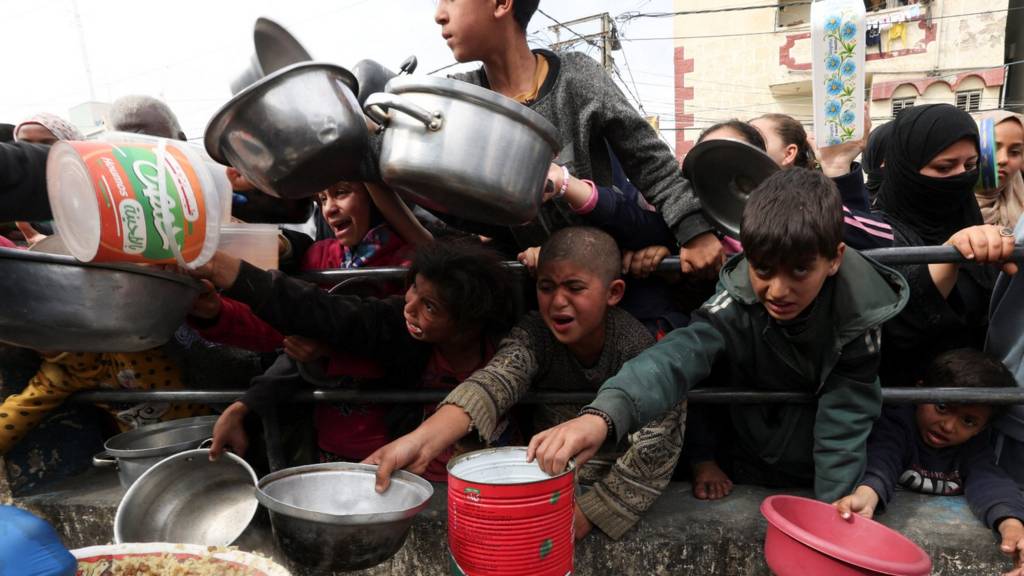
'We keep our bags packed in case we need to flee': Follow daily life in Gaza
The voices of Gazans, brought to you by a team in the Gaza Strip, Alice Cuddy in Jerusalem, BBC Arabic's Amira Mhadhbi, Lara Elgebaly and Haya Al Bardaneh, and Stephanie Hegarty in London
Related Video and Audio
RTL

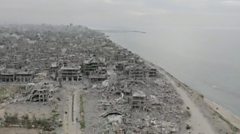
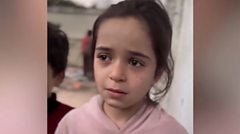
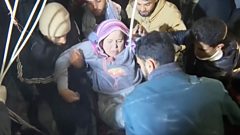
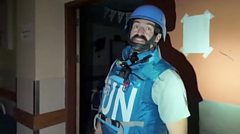
Live Reporting
Edited by Johanna Chisholm and Aoife Walsh
All times stated are UK
Get involved
-
A 12-year-old girl told us how she helps support her family by selling crisps on the side of the road
- One civil servant said her family is forced to sleep hungry because even bread is not always available. She has four children and is concerned about their education
- A tech entrepreneur told us about a hub he runs in Rafah, which allows people to access the internet with the help of solar panels for electricity. He worries his money will soon run out
- A media graduate from the north spoke about sharing a tent with seven other people in Rafah and how he wants to go home
- A doctor in central Gaza described how the over-crowded conditions at her hospital are fuelling the spread of disease, while another doctor in the north explained how electricity shortages are shutting down key hospital services
-
Around 1.7m Gazans are living in emergency shelters or informal sites due to the fighting
-
The Hamas-run health ministry says 29,700 Palestinians have been killed since the war began

Mohammad Al SheikhCopyright: Mohammad Al Sheikh 
Farida AdelCopyright: Farida Adel Farida has, at times, been forced to sleep on the streets since fleeing her home in Gaza CityImage caption: Farida has, at times, been forced to sleep on the streets since fleeing her home in Gaza City 
Getty ImagesCopyright: Getty Images Children wait in line for volunteers to dish out food in Beit Lahia, in Gaza's northImage caption: Children wait in line for volunteers to dish out food in Beit Lahia, in Gaza's north 
ReutersCopyright: Reuters Aid parcels are dropped over Rafah, in southern GazaImage caption: Aid parcels are dropped over Rafah, in southern Gaza 
Getty ImagesCopyright: Getty Images As we've heard today, sourcing water is a daily, often arduous task for many civiliansImage caption: As we've heard today, sourcing water is a daily, often arduous task for many civilians 
BBCCopyright: BBC 
BBCCopyright: BBC 
BBCCopyright: BBC 
.Copyright: . 
.Copyright: . 
BBCCopyright: BBC 
BBCCopyright: BBC Nagham sent us this photo of the scene at the Al-Aqsa Martyrs HospitalImage caption: Nagham sent us this photo of the scene at the Al-Aqsa Martyrs Hospital 
.Copyright: . 
Sami Abu OmarCopyright: Sami Abu Omar Sami Abu Omar prepares soup for displaced families in RafahImage caption: Sami Abu Omar prepares soup for displaced families in Rafah 
Rewaa MohsenCopyright: Rewaa Mohsen This meal for Rewaa's family cost her $40 (£31)Image caption: This meal for Rewaa's family cost her $40 (£31) 
.Copyright: . 
Malak Al DeirbiCopyright: Malak Al Deirbi Malak (L) eats with her familyImage caption: Malak (L) eats with her family 
Aseel MousaCopyright: Aseel Mousa Aseel MousaImage caption: Aseel Mousa 
BBCCopyright: BBC 
Mohammed SalhaCopyright: Mohammed Salha 
BBCCopyright: BBC 
BBCCopyright: BBC A young girl holds her baby brother tightly outside Al-Aqsa Martyrs Hospital in Deir al BalahImage caption: A young girl holds her baby brother tightly outside Al-Aqsa Martyrs Hospital in Deir al Balah 
Rewaa MohsenCopyright: Rewaa Mohsen 
.Copyright: . -
US President Joe Biden told reporters last night he hopes to see a ceasefire agreement reached by "next Monday"
-
Biden's comments arrived shortly after an Israeli delegation arrived in Qatar for intensive talks with mediators to draw up terms for a deal
-
The meetings come on the heels of negotiations held in Paris last week, where a basic outline was discussed
-
It included a 40 day pause in all military operations, the release of Israeli hostages held by Hamas, and the release of Palestinian prisoners
-
But Biden's hopes for an imminent ceasefire have not been shared by Hamas officials, who played down his optimism
-
Speaking to the BBC, one official familiar with the negotiations said the deal would most likely be rejected because it does not meet the group's minimum requirements
-
"The priority for us in Hamas is not the exchange of detainees, but the cessation of the war," the senior Hamas official said
Latest PostHearing from Gazans in their own words
Thank you for joining us today. We've been speaking to Gazans throughout the day to bring you a more detailed look at how dramatically people's daily lives have changed after nearly five months of war.
It's now 21:15 in Gaza and we are ending our special coverage for the day.
This page was brought to you by Alice Cuddy, Fergal Keane, Tarik Habte, Amira Mhadhbi, Lara Elgebaly, Haya Al Bardaneh, Stephanie Hegarty and Gabriela Pomeroy. It was edited by Aoife Walsh, James Harness, Sam Hancock and Johanna Chisholm.
'Two children died of dehydration today'
We've heard from Dr Mohamed Al Sheikh again, who spoke to us earlier from the Al Shifa Hospital in northern Gaza. Here's his latest update, sent to us with the selfie above:
I finished a round of searching for baby milk after the death of more than two children from dehydration for over half an hour and started to feel a headache coming on, so I took a break.
'We know we could die at any moment, it's psychologically draining'
We've made contact with 26-year-old Farida Adel, an English teacher from Gaza City, who spoke to the BBC last year - soon after the fighting began. She is currently sheltering in Rafah, south Gaza, and tells us the following about her situation:
"I don’t know where to start," she messages. "Every morning I don’t expect to still be alive.
"Every night we know we could die at any moment, which is psychologically draining. We are so exhausted, so devastated from this condition, this war has gone on for too long."
When Farida fled Gaza City, she left behind her parents and four siblings - Diana, Jihad, Hosni and Youssef. She says there is nothing left to eat where they are.
"I really miss them," she says. "The last thing I think about before going to sleep is my family. If they’re able to eat, if they’re still alive.
"Yesterday my heart broke when my sister Diana sent me a picture of bread made from animal feed, which is all they have to eat there."
In pictures: Gaza this afternoon
While we continue to bring you some of the voices and perspectives of people living in Gaza, here are some of the latest scenes being captured by photographers from across the region:
A medical student says days end early because there's no electricity
Nagham Atef Mezied, a medical student, has clocked off for the day and explains what it is like in Gaza as day turns to night:
I finished my shift at around 17:30 local time (15:30 GMT) and went back home. I wished for a hot shower to release the fatigue of the day, but that of course wasn’t possible as we have no gas and no water.
We will try to sort out some dinner now, canned chickpeas and fava beans most probably.
The day in Gaza ends early now because we have no internet and no electricity - we have nothing to do and we try to sleep early and have some rest in case the night brings bombs and terror.
So we are at least able to cope.
'Many people lost their work when the war began'
We spoke to Salah Ahmed earlier, a tech entrepreneur who runs a hub in Rafah that allows people to access the internet amid the fighting. Here, he tells us a bit more about his initiative:
We came up with this idea for the Hope Hub - a space for tech freelancers to get internet access - because we thought we should provide people with the opportunity to continue working.
A lot of freelancers lost their work when the war began. Some friends helped me to establish the initiative, they funded it for three months.
The staff here are working for free. I provide them with internet for free and we have electricity from solar panels. We are trying to create a productive environment where people can work and feel comfort.
We have graphic designers, motion graphics designers, programmers, content writers, digital marketers. The internet is slow but it's working.
'My internet connection drops when I try to work'
We checked in with journalist Aseel Mousa, who tells us that many people in Gaza don’t have internet access.
She says her friends in the north have asked her for help getting eSims - a virtual Sim card which you can load on to your phone.
While the internet is working as she messages with us, she says it “keeps breaking up” when she is trying to work, and makes staying in touch with her brother who lives abroad difficult.
A mother begs for ceasefire and prosthetic leg for wounded son
We're hearing from Dr Mohamed Al Sheikh, who has been working this morning at Al-Shifa, the main hospital in northern Gaza. While there, he's come across three-year-old Jude Mohammed al Ar’een and his mother, who had this to say about her son's condition:
Jude was injured. We were seeking shelter, he was injured, and his brother was killed along with a cousin, as well as several other injuries to our family members.
My son lost his leg. He suffers because he can no longer move like other children or play. He has so many questions as a three-year-old child.
I ask for a ceasefire and a prosthetic for my child, as this is affecting him.
Cramped hospitals and poor sanitation are fuelling disease
We've been hearing all day from medical student Nagham Atef Mezied, 22, in Deir al Balah. She sent us this recent update on conditions inside the Al-Aqsa Martyrs Hospital, where she is volunteering:
The hospital is overflowing with displaced people seeking shelter. It has become a refuge for those who have lost everything – their homes, their loved ones, their sense of security. Some sleep in makeshift shelters and tents on the hospital grounds. Others find solace in the narrow corridors.
Within these crowded walls we also have contagious diseases such as influenza, hepatitis, lice, and scabies spreading unchecked, fuelled by the cramped conditions and lack of proper sanitation.
The scarcity of even the most basic medical equipment and supplies further compounds the challenges faced by the dedicated healthcare workers.
A widow says she's living in 'cinematic movie of fear'
Earlier we told you about Samira Noorallah, 65, whose husband died of a stroke. She reconnected with us, sending this note:
Today we woke up to fear and terror for the young and the old. The reason is the drone because 24/7 this drone is flying to film, gather information. God only knows.
We can’t reassure our kids because we ourselves are already scared. We think that it may hit us and may not. We are living in fear, fear, fear. We are in constant fear it will bomb us … we live in a cinematic movie of fear.
As I am talking to you the drone is flying above us!
'We made lentil soup so displaced people feel at home'
We last shared a post about Sami Abu Omar this morning.
A few hours later, we heard from him again when he was still at the food distribution centre, serving up soup, before the connection dropped out.
At our last point of contact, he said they had got through four pots of lentil soup, served up to displaced families.
He said they would continue doing it throughout the day.
“Today it’s cloudy and there might be rain soon. Our mothers, when this kind of weather comes, make lentil soup, so we’ve done this too for the displaced people so they feel more like they’re at home,” he said.
‘We are blessed that we can afford two meals’
Like others we’ve been speaking to throughout the day, Rewaa, who is living in Deir al Balah in Central Gaza, has been eating her second and final meal of the day.
“This meal cost us more than $40 (£31)," says Rewaa over WhatsApp while sharing a video of her lunch of chicken, olives and peppers.
“We don’t have different types of food. We are blessed that we can afford two meals. Some people can’t afford any.”
She says the other major problem is nappies, which can cost $80 (£63) for a pack of 43. Rewaa is a mother to two young children, one is less than 5 months old.
“I had to put toilet paper in the diaper for the day and change it once,” she writes.
Her oldest daughter, who is just two years old, is wearing the same clothes she was in last year, which she describes as “short but fine”.
"There are no clothes and if we can find any, it costs a lot of money.”
'Sometimes we can't get hold of any food'
We're hearing more from 12-year-old Malak Al Deirbi, who has just taken a break from selling crisps to eat a meal:
Every day, I make my uncle sit at the kiosk and I come to my house to eat with my family. Every day our food is tinned food.
Sometimes we can’t get hold of it because my brother is busy getting water and he tries to go to an aid place to find some but by then it’s all gone.
This is what the situation is every day with food.
'I'm anxious and tense all the time'
We’ve just had another update come through from Aseel Mousa, the 26-year-old journalist in Rafah:
Before the war at this time, I used to be coming back from work to my home, and then I would relax on my bed and talk to my mum about my day. Now, it is not just boredom. It’s anxiety, tension all the time.
Now we will prepare lunch, which will be canned peas, because there is nothing fresh. We only really eat tinned food. We don’t even have snacks.
How many people in Gaza have been displaced?
According to the UN, just over 75% of Gaza's population - some 1.7 million people - were already registered refugees before Israel warned Palestinians to leave northern Gaza.
Palestinian refugees are defined by the UN as people whose "place of residence was Palestine during the period 1 June 1946 to 15 May 1948, and who lost both home and means of livelihood as a result of the 1948 War". More than 500,000 of the refugee population lived in eight crowded camps located across the Strip.
Following Israel's warnings after 7 October, many of those refugees joined the hundreds of thousands of people forced to flee their homes, the UN says.
About 1.7 million Palestinians are now gathered in emergency shelters or informal sites set up nearby.
On average, before the conflict, there were more than 5,700 people per sq km in Gaza - very similar to the average density in London. The UN says more than half of Gaza's population is now crammed into Rafah - a town of originally 250,000 people.
Electricity shortage shuts down key hospital services
Another doctor, this time from northern Gaza, is now telling us about the situation there. In a voicenote, Dr Mohammed Salha explains how three departments at his hospital stopped running today because of electricity shortages:
Today, we stopped the operating department and also the laboratory department and the X-Ray department because we can’t run the generator.
We are providing emergency services only.
Dr Mohammed has also sent over photos of staff inside the hospital cooking.
Like others in Gaza we’ve been hearing from today, he says staff have been baking bread over fire.
'We're seeing a huge number of kids in hospitals'
Twenty-two-year-old Nagham Atef Mezied, the medical student two years out from graduation, is now telling us about how children in Gaza are faring without regular access to food, clean water or clothes:
We are receiving a huge number of kids in hospitals. Some are victims of bombing of populated areas. Others are suffering as a result of hunger malnutrition and lack of basic needs.
The lack of milk and formula milk is aggravating the situation. If ever available, they are highly priced. [Sometimes] ten times higher than what it used to cost before and most of parents can’t afford it.
So many kids are suffering from anaemia and an iron deficiency. The lack of enough healthy food is having it’s impact on kids now, and it will have long-term impact [on] their health and growth.
Also, lots of families are struggling to find nappies for the kids. They use clothes in substitution, which results in hygiene-related problems and skin irritation.
The situation here is dire and even more in the north where food is not available anymore.
'We haven't eaten chicken for months'
Back to Rewaa now, who's sharing some pictures of her eldest daughter's lunch: chicken broth.
She tells us she how glad she is to have found it, adding: "We haven’t eaten chicken in four months."
'We are forced to go to sleep hungry'
We’ve just heard more from Nashwa Rezeq. Like others we’ve been speaking to today, she tells us of the difficulty of finding food.
“We buy canned goods and we buy vegetables, and the prices of canned goods and vegetables are very expensive and ridiculous. We try to save as much as we can and we are forced to sleep hungry because even bread is not always available,” she says via WhatsApp.
“Water prices have also become astronomical,” she says.
“We have forgotten the luxuries of life.”
She has four children and says the situation with education is “disastrous”.
“The schools have all become a place for the displaced - filled with a lot of people and garbage and sewage. Nobody is talking about education at all. It is becoming a thing of the past," she says.
What's the latest on a possible ceasefire deal?
As we continue to bring you voices and perspectives of people living in Gaza, let's take a quick look at the latest developments on a possible ceasefire deal: